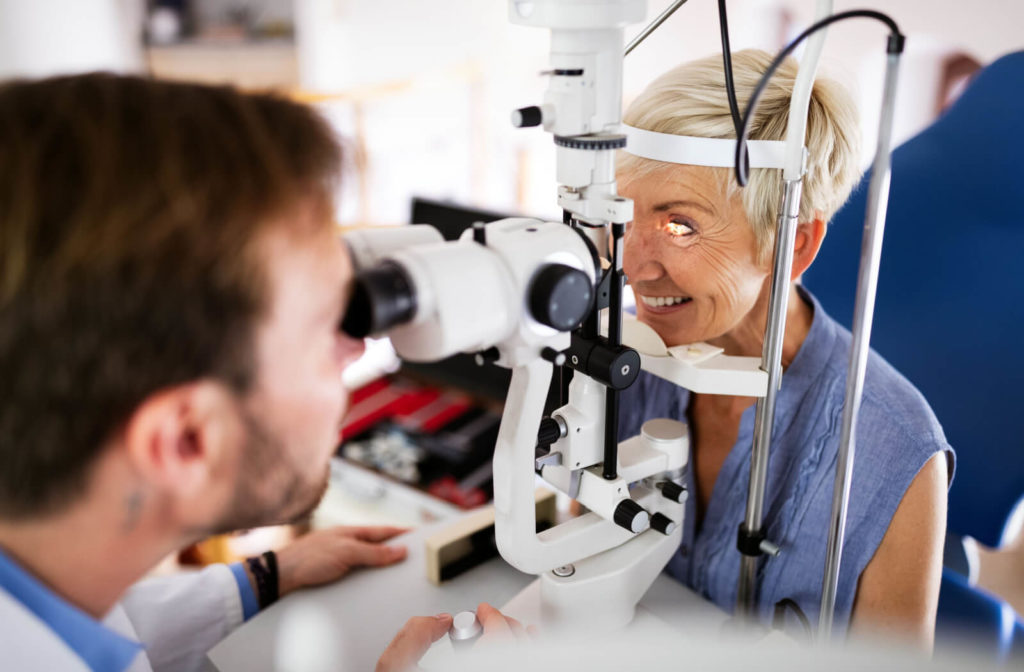Glaucoma is sometimes known as the “silent thief of sight” because it often creeps up on people without showing symptoms until it’s too late. If left untreated, it can lead to permanent vision loss or even blindness. That’s why knowing if you’re at risk of developing glaucoma is so vital.
Glaucoma is partially genetic, meaning you can inherit it from a parent or grandparent. Or, at least, your genes can increase your risk of getting it.
If this is the case, you should take extra care to keep up with regular comprehensive eye exams. Optometrists can examine your eye health and watch for signs of glaucoma before this silent thief sneaks up on you.
What Is Glaucoma?
Glaucoma is a group of eye diseases that damage the optic nerve, which connects the eye to the brain. It’s one of the leading causes of blindness and affects more than 728,000 Canadians.
Glaucoma can come in a few different types, typically relating to a fluid build-up inside the eye which increases intraocular pressure (IOP):
- Open-angle glaucoma: The most common type is open-angle glaucoma, which makes up about 90% of all cases. It occurs when IOP increases and damages the optic nerve. Open-angle glaucoma develops gradually, and people often don’t notice any symptoms until it’s too late.
- Angle-closure glaucoma: Angle-closure glaucoma is a less common type of glaucoma that can develop rapidly. It occurs when the eye’s drainage canals are blocked, causing a sudden increase in IOP. If you experience eye redness, pain, blurry vision, nausea, vomiting, and headaches, seek prompt medical attention, as this type could cause vision loss in a day.
- Secondary glaucoma: Secondary glaucoma develops due to another eye condition or injury. It can also occur as a side effect of some medications, such as corticosteroids.
- Normal-tension glaucoma: Normal-tension glaucoma occurs even when IOP is within the normal range. It’s not entirely clear why some people develop normal-tension glaucoma, but it may be due to poor blood flow to the optic nerve.
What Causes Glaucoma?
So, the question at the heart of things is: can you inherit glaucoma from a parent or grandparent? The short answer is yes, but it’s not as simple as that, so don’t blame your ancestors yet.
Glaucoma is a complex disease that involves genetic and environmental factors. Studies have shown that at least open-angle glaucoma is hereditary. However, other types can be the result of other factors, such as:
- Age
- Ethnicity
- Eye injury
- Surgery
- Cardiovascular conditions, such as high blood pressure
- Retinal detachment
- Eye tumours
Glaucoma Symptoms
The symptoms of glaucoma vary depending on the type and stage of the disease. In the early stages, there may be no symptoms at all. As the disease progresses, the following symptoms may appear:
- Blurred or hazy vision
- Halos around lights
- Loss of peripheral vision
- Redness in the eye
- Eye pain
- Nausea and vomiting
- Eventually, total vision loss
If you experience any of these symptoms, especially with a family history of glaucoma, you should see an optometrist for a comprehensive eye exam. The earlier glaucoma is detected, the better the chances of preserving your eyesight.
How is Glaucoma Detected?
So now we know that if you have a family history of glaucoma, you are at a higher risk of developing the condition. The good news is the condition can be detected through regular optometry check-ups.
The first step in diagnosing glaucoma is to measure the IOP using an instrument called a tonometer in a non-invasive process. This device can either be a gentle plunger placed against the eye or a puff of air. In either case, it measures your IOP to detect signs of glaucoma.
Your optometrist may also check your medical history and perform a comprehensive eye exam, including a visual field test and optic nerve evaluation. Visual field testing checks your peripheral vision and determines if any vision loss has occurred.
Another examination method is using optical coherence tomography (OCT). This diagnostic technology uses light waves to create a detailed cross-section of your retina. This new viewpoint lets your optometrist map your retina and look for damage.
Treating Glaucoma
The treatment options for glaucoma depend on the type and stage of the disease. The goal is to lower the intraocular pressure and prevent further damage to the optic nerve.
The most common treatments are eye drops, which can reduce the amount of fluid in the eye or increase fluid outflow. Other treatments, such as laser trabeculoplasty, may be recommended if eye drops are ineffective or cause side effects.
Taking the Pressure Off In Mississauga
Glaucoma is a serious eye disease that can lead to vision loss or blindness if left untreated. While you can inherit glaucoma from a parent or grandparent, it’s not a simple matter of genetics. Other factors, such as age, race, and medical history, also play a role.
Queensway Optometric Centre can examine your eyes, look for signs of glaucoma, and guide you through the treatment process with expertise and care.If you have a family history of glaucoma, don’t hesitate to book an appointment for a comprehensive eye exam. Remember, early detection and treatment are key to preserving your eyesight.


